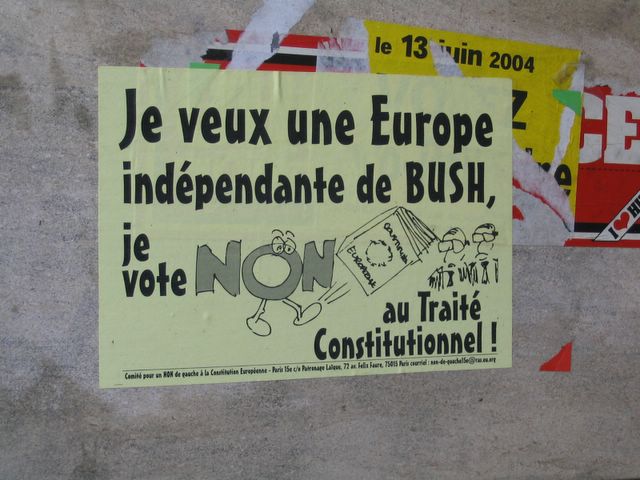.
[Fill in blank] is a fascist, so don’t listen to what they say.
The argumentum ad hominem is attacking a person rather than the arguemnt they are presenting. It is always invalid on grounds of irrelevance, even if the accusation is true. For example “SoandSo makes that statement because he is a 'gruby worn and a low life'” Even if the accusation is true and SoandSo is a 'gruby worm and a low life', what they said is right or wrong on it’s own merits. SoandSo’s status (true or false) as a 'gruby worm and alow life' is irrelevant to what they are saying.
Since WWII, it seems that everyone’s favorite argumentum ad hominem is the argumentum ad hitlerum. That person is a Nazi or Facist or something similar. It has been used for so long against so many people in so many different situations, unrelated to the historical context, that the term means “someone I don’t like.’ It communcates no real knowledge about the person or what they are saying. Even, on the chance of random probability, it is most likley false. The worst part about this is that there is such a thing as Fascist ideology. Persons supporting this ideology, if they avoid certain keywords, can easly escape recoginiton in all the false claims. The substance of fascist ideas could be presented with differernt terms and not be noticed by the unsuspecting. It would not be surprising for fascists to be loudest in accusing their opponents of being fascists
I went to google to see how wide spread this phenomenon is. I made entries in different comibnations of “Is (was) a fascist (nazi)” to see what I would get. The following is a small sample. This is just items that appeared in the sample text Google displays. To be fair while some are serious, some are humor, and some are defending someone against the accusation, which of course means the accusation was made. Some show much study and thought, some are ignorant and thoughtless.
Dobson is a Fascist
LePen was a fascist
Brigitte Bardot is a fascist!
Hitler was a fascist
To modern-day Leftists anybody they disagree with is a "fascist”
Every Jew-baiter, every Catholic hater, is a fascist
Santa is a fascist!
China is a fascist country
My Tivo is a fascist
Fidel Ramos is a fascist
Peter Singer is a fascist.
Zarqawi is a "fascist"
Heidegger was a professed fascist
Richie Rich is a fascist!
Bill Clinton is A Fascist
Hillary Clinton is a fascist
[Hugo] Chavez is a fascist
Hillary Duff Is A NAZI!
Janie Is A Nazi
Everybody's a Nazi
John F Kennedy was a Nazi
Ted Kennedy is a nazi
[Ward] Churchill is a fascist,
Reno is a fascist,
Castro is a fascist
Saddam was a fascist
Your Dog Is a Fascist
Ezra Pound was a fascist
Bin Ladin is a fascist
Diana Mosley was a fascist
I was a fascist
[Winston] Churchill was a fascist
Roosevelt was a Fascist
Harry Potter is a Nazi
Los Angeles Shooter is a Nazi
Joseph P. Kennedy Sr. was a Nazi
Marx was a Nazi
Stalin was a nazi
Mao was a nazi
Che was a fascist
Heinlein's a fascist idiot
Bobby Fischer is a Nazi
Dean is a Fascist
Al Gore is a fascist
John F. Kerry is a fascist
And Crumpy Blog provides the best comment on the most popular “ is a Fascist (or Nazi)” response
- namely -
“Bush is a Fascist”
. . . I don't like people who pick a political stance because it's in fashion to do so. I saw a person wearing a Bush=fascist shirt. I asked her in a non-confrontational way, "Why do you think Bush is a fascist?" The response was, "Because of the stuff he does". I inquired "what stuff is that?" The response was "the Patriot Act". Playing dumb I asked, "What is the Patriot Act?" She said, "it takes our rights away." When asked what rights does it take away she said, "Freedom of the Press, and religion." OK, at this point I know she didn't know what the hell she was talking about so I simply asked, "What is a fascist?" She again said "Bush." So I said "Besides Bush what is a fascist?" A blank look came over her face. After about 30 seconds I asked her "Well can you give me an example of a fascist other than Bush". Her answer was "the English guy, Mel Gibson, and the guy on the radio". At this point I wanted to see how far I could take it so I asked "How about that guy who lead Italy during World War II....what was his name....Benito Mussolini?" The response I got floored me. "No, he was cool" she said.
I would like to respectfully submit that there seems to be a serious general knowledge problem in the fields of History and Political Science.
2 years ago

